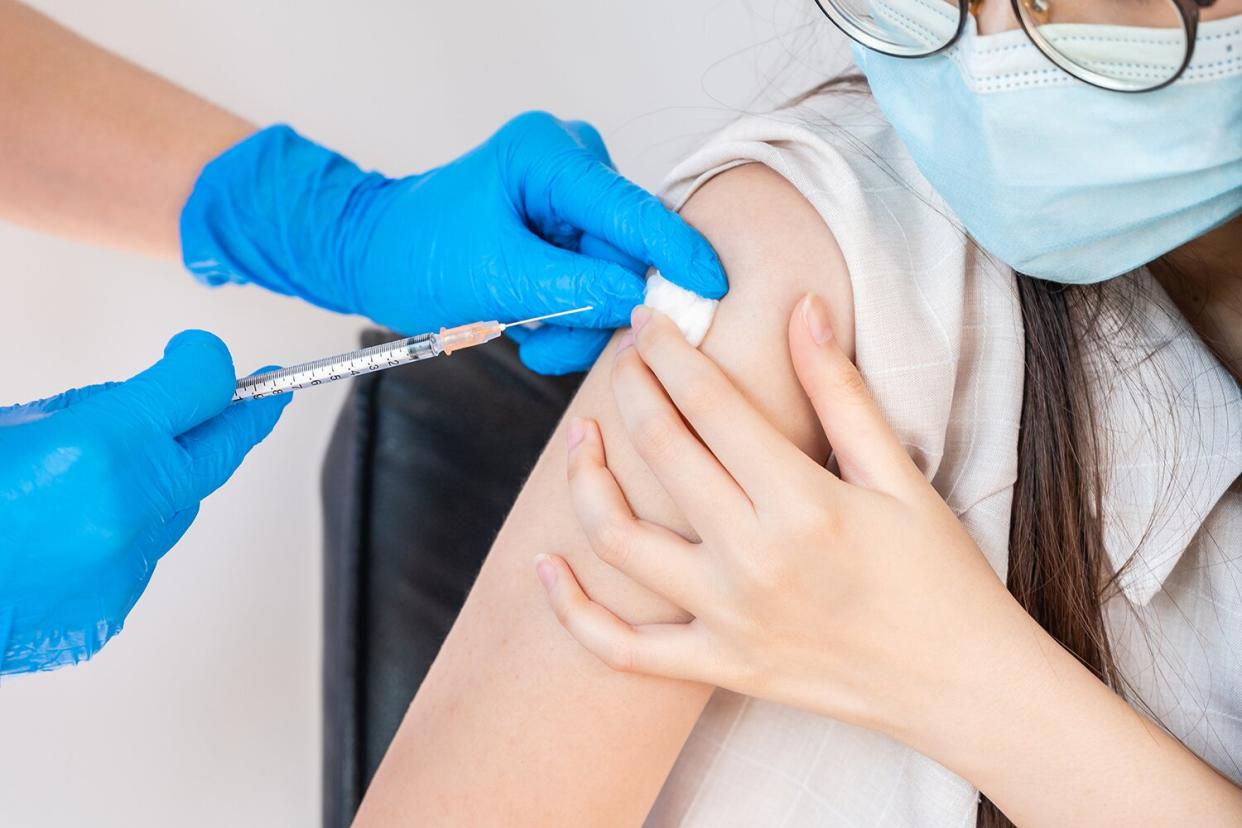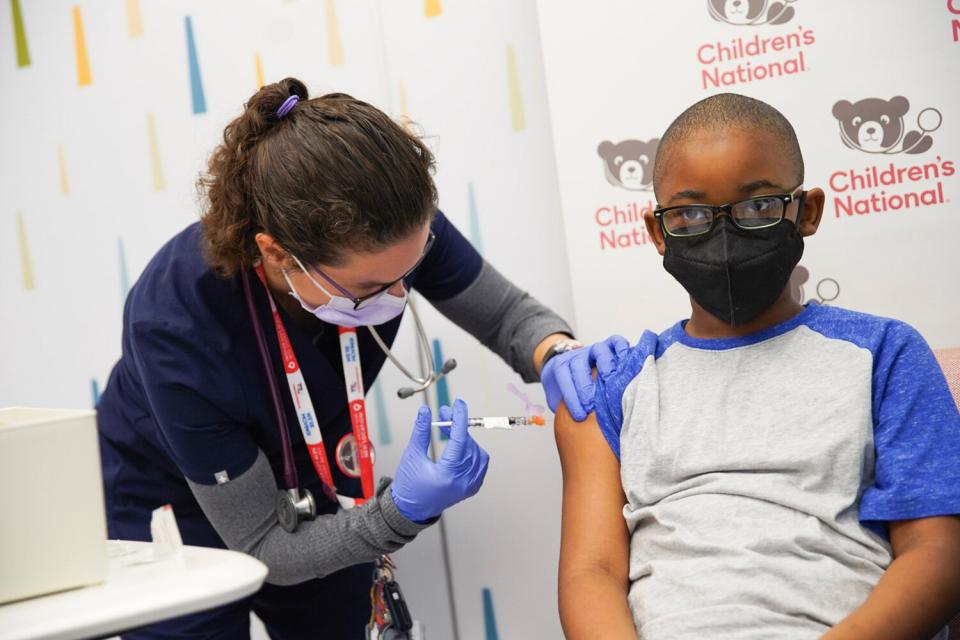Why It's Important to Get Kids 5 to 11 Vaccinated for COVID — and What Parents Need to Know

- Oops!Something went wrong.Please try again later.
Getty A child getting vaccinated
After months of waiting as pediatric COVID-19 cases soared, Pfizer's vaccine is now officially available for kids aged 5 to 11. The approval was a landmark moment in the fight against the pandemic, with nearly all Americans now eligible for a vaccine that will protect them against the often-deadly virus.
And while there is a large portion of parents who will immediately get their children vaccinated, recent polling has found that around one-third are hesitant, and another third do not intend to vaccinate their kids. Here, PEOPLE Health Squad pediatrician Dr. Elizabeth Murray, a specialist in Pediatric Emergency Medicine and Child Health Advocacy, shares what parents need to know about the vaccine and why it's important to get this age group protected against COVID-19.
Young kids typically don't get severely sick if they contract COVID-19 — so why should 5- to 11-year-olds get vaccinated?
"While children have, in general, had less severe illness than adults, their lives have definitely been impacted by COVID-19," Murray says. "Many thousands of children have been hospitalized and children in this age group have died from COVID-19 during the pandemic. Children also do spread the disease so anything we can do to lessen the illness, the better off we will be."
Plus, she adds, "it's also important to know that MIS-C, the severe post-COVID illness seen in children, is most common in this age group."

Children's National Hospital 8-year-old Carter Giglio after getting his first dose at Children's National Hospital in Washington, D.C.
How well has Pfizer's vaccine been tested and reviewed in kids aged 5 to 11?
"Very well! It's also important to remember that the research doesn't stop. There is on-going monitoring done via a number of groups to continue to look for any signs of safety concerns," Murray says. "Parents are encouraged to register their vaccinated children in the V-safe program so that they can record any side effects or health concerns. I did this for my 12-year-old and it was very simple. You (the parent) receive periodic text messages asking how your child is feeling. It takes less than a minute."
RELATED: Pfizer Says Its Vaccine Is More Than 90% Effective in Preventing COVID in Kids Aged 5 to 11
Should kids expect to have side effects?
"The side effect profile was pretty similar to that seen in older children. The most common being a sore arm, then muscle aches and fever," she says. "It is important to know that there were no serious adverse side effects seen in the 5-11 year age group."
Are allergies a concern?
"This is a very simple vaccine in terms of ingredients and it is incredibly rare to be allergic to any of the components," Murray says. "The consent form goes through some allergy questions for the parent to review before the vaccine is given."
RELATED VIDEO: Unvaccinated TikToker Who Died of COVID Spent Last Days Urging Followers to Get the Vaccine
This dosage is smaller than the one for people 12 and up — what should parents do if their child turns 12 in between doses?
"Don't worry! The recommendation is to receive the dose based on age," she says. "However, the EUA also states that if a newly 12 year old receives the lower dose as their second dose, that will be okay."
RELATED: What Parents Need to Know Now That Kids Aged 12 to 15 Are Eligible for a COVID Vaccine
What should wary parents know about the vaccine?
"Questions are normal and expected as this feels new," Murray says. "I say it feels new because this is the first time that a vaccine has been developed while the public was watching closely in real time. Understanding mRNA and the potential for use in a vaccine has been studied for over a decade, it's just that this is the first time we could use it for a vaccine."
She also cautions parents to be careful with what they read online, and to make sure that it's from reputable sources like doctors and COVID-19 researchers.
"The amount of disinformation on social media is unlike anything we have seen before. Very well-meaning parents can easily fall into dangerous rabbit holes of disinformation," she says.

Children's National Hospital 11-year-old Gilberto Talley after getting his first dose at Children's National Hospital in Washington, D.C.
In Murray's case, she and her husband were eligible for the vaccine in Dec. 2020, and got it immediately. When their older daughter turned 12 this summer, they immediately signed her up, and today their 5-year-old is getting her first dose.
"I know that this is an incredibly safe vaccine that has saved lives, decreases illness, and once fully vaccinated will allow my kindergartner to have an extra layer of protection to keep her safe in school and when out in the world," Murray says. "I wouldn't recommend vaccinating your children if I wasn't comfortable vaccinating my own."
RELATED: With Smaller Doses and Needles, Biden Administration Lays Out Plan to Vaccinate Kids 5 to 11
What impact will this approval have on schools, and for the upcoming holiday season?
"I live in the Northeast and we have done far better in terms of cases than other parts of the country. However, I am routinely evaluating for and admitting children to the hospital for COVID-19," Murray says.
"Data presented at the ACIP meeting [to authorize the vaccine] demonstrated that for every nine children vaccinated, a case of COVID-19 will be prevented. There will be some variability based on community rates but for many children, if they are exposed to COVID-19 they will not need to quarantine — meaning they will not need to miss school. That's great news! For holidays, especially if travel is involved, parents can be comforted knowing that their children have an extra layer of protection against this awful germ."
Plus, Murray says, by vaccinating children, they're helping to reduce the spread of COVID-19 and stop it from creating new variants like delta.
"Remember, every time the disease passes from one person to another, there is a chance for mutation," she says. "Anything we can do to decrease transmission means lessening the chance for variants and mutations."

